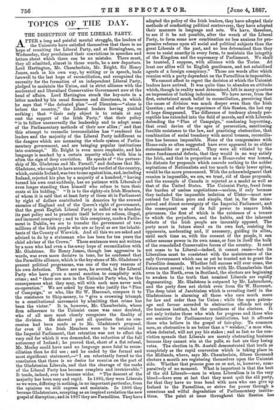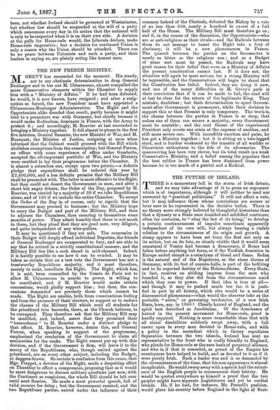TOPICS OF THE DAY.
THE DISRUPTION OF THE LIBERAL PARTY.
AFTER a long and painful mental struggle, the leaders of the Unionists have satisfied themselves that there is no hope of reuniting the Liberal Party, and at Birmingham, on Wednesday, they proclaimed their convictions in speeches and letters about which there can be no mistake. There must, they all admitted, almost in those words, be a new departure. Lord Harlington, Mr. Chamberlain, Mr. Bright, Sir Henry James, each in his own way, by writing or in speech, bade farewell to the last hope of reconciliation, and recognised the necessity for the formation of an independent Liberal Party, pledged to maintain the Union, and in strict alliance with the moderated and liberalised Conservative Government now at the head of affairs. Lord Hartington struck the key-note in a letter marked by his usual firmness and directness, in which he says that "the defeated plan "—of Disunion—"alone is before the country," the Liberal leaders having yielded nothing ; that " their only object is to retain at any cost the support of the Irish Party," that their policy "is to follow unreservedly the leadership and to adopt some of the Parliamentary methods of their new allies;' and that this attempt to reconcile irreconcilables has "rendered the leaders and the majority of the Liberal Party indifferent to the dangers which are menacing the whole system of Parlia- mentary government, and are bringing popular institutions into contempt." Mr. Bright is even more emphatic, and his language is marked by a certain asperity which with him is often the sign of deep conviction. He speaks of "the partner- ship of Mr. Gladstone and Mr. Parnell," and declares that Mr. Gladstone, who ought to have accepted the verdict of the country, which, outside Ireland, was two to one against him, and, including Ireland, rejected his plan by a majority of a hundred," having turned his own coat suddenly, has no patience with Liberals of even longer standing than himself who refuse to turn their coats at his bidding." "It is to the eighty-six Irish Members, of whom it is said that at least forty of them sit in Parliament by right of dollars contributed in America by the avowed enemies of England and of the Queen's right of government, that the great English Liberal Party is called on to abandon its past policy and to prostrate itself before an odious, illegal, and immoral conspiracy ; and to this conspiracy, made a Parlia- ment in Dublin, we are to transfer the government of two millions of the Irish people who are as loyal as are the inhabi- tants of the County of Warwick. And all this we are asked and advised to do by a statesman who has been for ten years the chief adviser of the Crown." Those sentences were not written by a man who had even a far-away hope of reconciliation with Mr. Gladstone. Sir Henry James, though leas aggressive in words, was even more decisive in tone, for he confessed that the Pamellite alliance, which is the key-stone of Mr. Gladstone's present political programme, was one of the very reasons of his own defection. There are men, he averred, in the Liberal Party who have given a moral sanction to complicity with crime ; and " there are men in the Unionist Party who, be the consequences what they may, will with such men never seek co-operation." We are asked by those who justify the "Plan of Campaign," or who, like Sir W. Harcourt, compare it to the resistance to Ship-money, to "give a crowning triumph to a constitutional movement by admitting that crime has been the victor." It is, however, Mr. Chamberlain, whose firm adherence to the Unionist cause was once doubted, who of all men most clearly recognises the finality of the division. He showed past all question that no con- cession had been made as to Mr. Gladstone's proposal, for even if the Irish Members were to be retained in the Imperial Parliament, that retention was not to effect the very end for which it was demanded, the redaction of the full autonomy of Ireland ; he proved that, short of a flat refusal, Mr. Morley could have used no language more fatal to recon- ciliation than he did use ; and he ended by the formal and most significant statement,—" I am reluctantly forced to the conclusion that there is no desire for reunion on the part of the Gladstonian Liberals, and that the cleavage of the ranks of the Liberal Party has become complete and irretrievable." It tends, indeed, ever to become wider. "The descent of the majority has been easy and rapid. In 1885, they were Liberals as we were, differing in nothing, in no important particular, from the opinions we still express and maintain. In 1886 they became Gladstoniane, accepting as an inspired revelation the new gospel of disruption; and in 1887 they are Pamellites. They have
adopted the policy of the Irish leaders, they have adopted their methods of conducting political controversy, they have adopted their manners in language and acts. We have, therefore, to see if it be not possible, after the wreck of the Liberal Party, to form some new combination no less anxious for pro- gresaive reforms upon all social and political subjects than the great Liberals of the past, and no less determined than they were to resist anarchy in every form, to maintain the integrity of the Kingdom and the supremacy of Parliament. We shalt be taunted, I suppose, with alliance with the Tories. At least our allies will be English gentlemen, and not sabsidised agents of a foreign conspiracy." Those are words after which reunion with a party dependent on the Parnellites is impossible.
We cannot affect to regret the decision at which the Unionist leaders have arrived. It was quite time to abandon an attitude which, though in reality most determined, left in many quarters an impression of lurking indecision. We have never, from the first, entertained much belief in reconciliation, perceiving that the cause of division was much deeper even than the Irish Question ; and after the experience of this Session, the last ray of hope disappeared. The difference of tendency already per- ceptible has extended into the field of morals, and with Liberals defending the "Plan of Campaign," condoning boycotting, that crael device of the ages of persecution, sanctioning forcible resistance to the law, and practising obstruction, that combination of social treachery with moral treason, reconcilia- tion has become impossible. None of the compromises with Home-rule so often suggested have ever appeared to us either statesmanlike or practical. They were all vitiated by the same fundamental defects, that they would in no way satisfy the Irish, and that in proportion as a Home-ruler was honest, his distaste for proposals which concede nothing to the nobler aspirations of Nationalists and too much to their lower spites, would be the more pronounced. With the acknowledgment that reunion is impossible, we are, we trust, rid of those proposals, and the example of Canada is rejected as a model as well as that of the United States. The Unionist Party, freed from the burden of useless negotiations—useless, if only because they included the impossible isolation of Ulster—must now contend for Union pure and simple, that is, for the unim- paired and direct sovereignty of the Imperial Parliament, and the consequent use of its full power to remove Irish grievances, the first of which is the existence of a tenure to which the prejudices, and the habits, and the inherent defects of the Irish people are incurably opposed. The party must in future stand on its own feet, resisting its opponents, moderating and, if necessary, guiding its allies, until such time as, with the consent of the people, it can either assume power in its own name, or fuse in itself the bulk of the remodelled Conservative forces of the country. It need not cease to be Liberal—indeed, it cannot cease—but its Liberalism must be consistent with the maintenance of the only Government which can as yet be trusted not to grant the Parnellite demands. Whether full success will ever come, the fature must reveal ; but we believe with Mr. Chamberlain that even in the North, even in Scotland, the electors are beginning to awaken to the truth that nominal Liberals are rapidly degenerating. Mr. Gladstone is outpaced by Mr. Labouchere, and the party does not shrink even from Sir W. Harcourt. The deep taint of Jacobiniem which is revealing itself in the Gladstonians is alarming all those who care much more for law and order than for Union ; while the open patron- age and favour accorded to obstruction offends not only the business instinct, but the manliness of the electors. It not only irritates those who wish for progress and those who are sensitive for Parliamentary institutions, but it affronts those who believe in the gospel of fair-play. To common men, an obstructive is no better than a " welsher," a man who, when defeated, will not pay his stakes ; and as fast as the con- viction spreads that Liberals are merely obstructing business because they cannot win at the polls, so fast are they losing votes. The election in St. Austell demonstrated that truth as completely as the rapid conversion which is taking place in the Midlands, where, says Mr. Chamberlain, fifteen thousand electors a month are registering themselves upon the Unionist side. Whether that process goes on or not, is, however, com- paratively of no moment. What is important is that the best of the old Liberals—men in whom Liberalism is in the very blood—have seen at last that they must quit the old party, for that they have no true bond with men who can give up Ireland to the Parnellites, or strive for power through a conscious and wilful degradation of Parliamentary institu- tions. The point at issue throughout this Session has
been, not whether Ireland should be governed at Westminster, but whether law should be suspended at the will of a party which announces every day in its action that the national will is only to be respected when it is on their own side. A decision at the polls for Home-rule would, the Liberals declare, make Home-rule imperative ; but a decision for continued Union is only a reason why the Union should be attacked. There can be no peace between Unionists and such a party, and their leaders in saying so, are plainly acting like honest men.



































 Previous page
Previous page